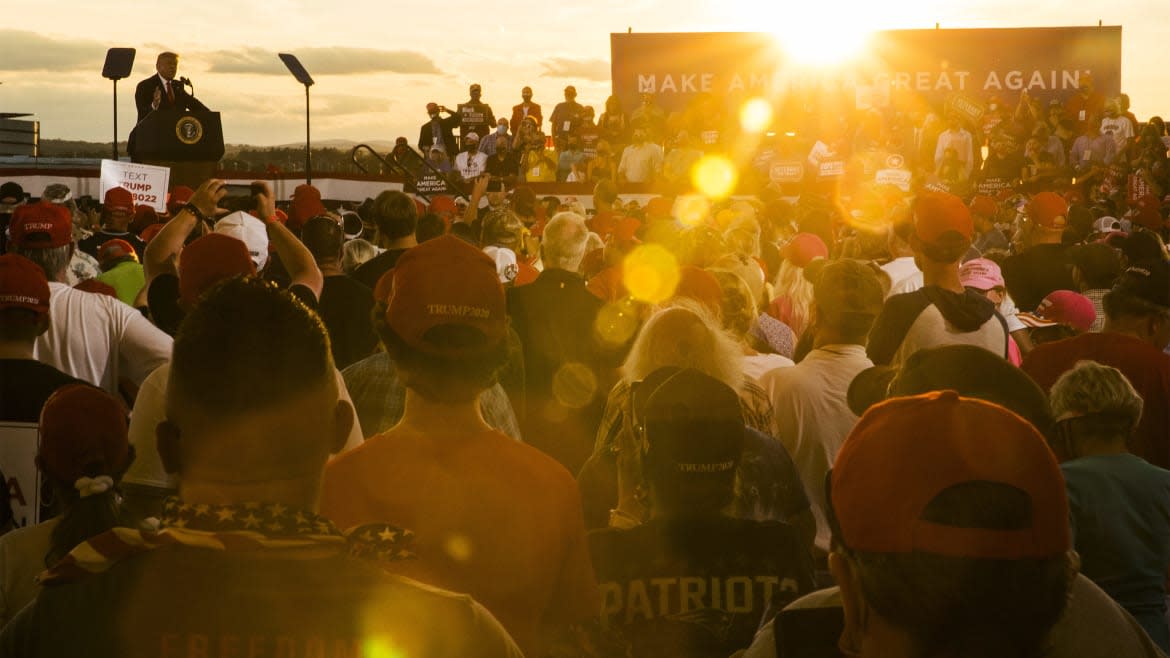Does Donald Trump Have an Invisible Army?

If you don’t think Donald Trump could still win this election, then you’re snorting better Xanax than I am. Trump is a preternaturally gifted demagogue with riots and a bully pulpit to exploit. He has three debates still on the calendar, a history of stunning everyone, and a couple of months to work his magic. Counting him out at a time when cities are on fire would be insane.
And here’s another reason: There are millions of potential voters out there you’ve probably never even thought of. And unlike the assumption that “bringing in new voters” means moderating your message or “going to the center,” these are people who are more likely to vote the more Trump’s handlers let Trump be Trump.
According to Dave Wasserman, U.S. House editor of the nonpartisan Cook Political Report and an NBC News contributor, “…in 2016 there were *4.8 million* eligible non-college whites across MI, PA and WI who didn't vote. In 2016, Trump won those states by a combined 77,744 votes.”
If Trump can just find enough new voters in just the right places (some could even be hiding in progressive enclaves), he could lose by up to 5 points nationally and still win the Electoral College. This kind of unlikely but plausible scenario should be keeping Democrats awake at night.
Don’t Fool Yourself, Libs. Trump’s Show Is a Yuge Success.
Combined with trying to woo back suburban “soft Republican voters” and attempting to peel off some African-American men (or, more realistically, deprive Biden of fully reassembling the Obama coalition), finding a way to turn out a new crop of voters could be Trump’s secret weapon—a way to flip the script on the so-called “experts” and their fancy election models based on historical data.
But just knocking on someone’s door and asking them to vote probably isn’t enough. To pull this off, Trump would need something else. Something bigger.
You don’t have to be cynical about human nature to see how riots tap into the primal fears of the very voters Trump needs to turn out to vote. Few issues pack the kind of emotional punch needed to overcome the weird mix of non-voter apathy, a global pandemic, and an economic downturn, but the combination of street violence and racial anxiety could do the trick.
Even with a hot-button emotional issue, it’s unclear whether Trump has the vision, bandwidth, or logistical manpower to convert non-voters into showing up and voting for him. This kind of effort takes a machine, which conflicts with Trump’s shoot-from-the-hip ethos. But consider that The New York Times recently described Trump’s new campaign manager Bill Stepien as “highly disciplined and data-obsessed.”
It’s also worth asking why this opportunity even exists in the first place. Why are millions of people not voting in America? The answer, in part, is that they have been forgotten. Political strategists make assumptions about people based on many things, including race, geography, gender, voter history, and more. And because they value efficiency, they weed out people who are presumed to be either (a) unlikely or ineligible voters or (b) non-persuadable. People who don’t vote have a history of not voting. This puts them in the “unlikely” category.
This “strategy" makes sense in the short term, because every campaign has limited resources. In the long term, though, you end up with millions of Americans who aren’t just choosing not to vote for a plastic politician (thanks, Mitt Romney!), they’re not even being courted. This becomes a vicious cycle because politicians are more likely to only pursue the kinds of policies and messages that appeal to today’s likely voters, which turns these folks off even more.
The upshot here is that Trump could actually be (pardon the cliché) thinking outside the box. Combined with trying to win back some suburban voters and Black men, he could patch together a tenuous Electoral College majority. (It’s too early to predict to what degree this is happening, since you can register to vote as late as mid-October in the aforementioned Rust Belt states.) But if he’s doing it, his efforts probably took a hit on Monday when Biden forcefully condemned the rioters.
We may look back at this day and remember it as the time Biden kept this race from slipping away.
No, Biden’s speech won’t put the issue to bed. But it keeps a narrative that was developing from metastasizing. It keeps Trump from getting a clean hit on Biden, and keeps the charges of Biden being an empty vessel of the left from even sounding plausible.
With 63 days left to go, we can expect (as Biden said) things to get worse before they get better. After all, Trump is desperate, and even if he’s attempting to remake the electorate, “fomenting” anger and violence strike me as necessary ingredients.
Trump is a political street fighter. But on Monday, Biden demonstrated that he knows how to throw a punch, too.
If Donald Trump’s plan for turning out voters was counting on Joe Biden’s refusal to condemn the rioters, his job just got a whole lot harder.
Get our top stories in your inbox every day. Sign up now!
Daily Beast Membership: Beast Inside goes deeper on the stories that matter to you. Learn more.

